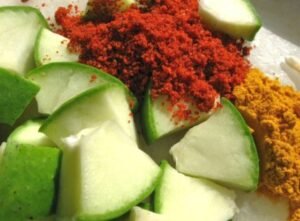Medically reviewed by Dr. Ramesh Gaddam, M.D. — Written by Sumalatha, D.N.H.E
A “sour mango” also known as Raw Mango is usually a green or unripe mango that has a tangy and tart taste. These mangoes are picked before they fully ripen and get their usual sweet flavor. Sour mangoes taste different from ripe ones – they’re tangy, crisp, and might have a bit of astringency.
Nutrition of Sour Mango
The nutritional profile of sour mango can vary slightly based on factors such as size, variety, and ripeness. Here’s a general overview of the nutritional content found in 1 cup (about 196 grams) of sliced, raw, sour mango:
- Calories: 60
- Protein: 0.9 grams
- Carbohydrates: 15 grams
- Dietary Fiber: 1.6 grams
- Sugars: 12.7 grams
- Fat: 0.4 grams
In addition to these macronutrients, sour mangoes provide various vitamins and minerals, including:
Vitamin C:
Sour mangoes are rich in vitamin C, which is essential for immune function, skin health, and antioxidant protection.
Vitamin A:
Mangoes contain beta-carotene, a precursor to vitamin A, important for vision, immune function, and skin health.
Folate:
A B-vitamin important for DNA synthesis and cell growth.
Vitamin E:
An antioxidant that helps protect cells from damage.
Sour mangoes also provide small amounts of vitamins like vitamin K, B-vitamins (B6, niacin, riboflavin, thiamine), and minerals such as potassium and magnesium.
Nutritional content can vary, so it’s always a good idea to check specific details based on the type of mango and its ripeness.
Additionally, the sour taste in mangoes is often due to the presence of compounds like citric acid and malic acid.
Types of Sour Mango
There are several types of sour or unripe mangoes, each with its own unique flavor profile and culinary uses. Here are a few common varieties:

Totapuri:
This variety is known for its distinct shape, with a pointed end. Totapuri mangoes are widely used in making pickles and chutneys due to their sour taste.
Alphonso (Hapus) before Ripening:
The famous Alphonso mango, when unripe, is also sour. It’s often used in pickles, salads, and culinary preparations where a tangy flavor is desired.
Kesar before Ripening:
Kesar mangoes, another popular variety, are sweet when ripe but have a sour taste when unripe. They are used in pickles and various dishes in their raw form.
Langra:
Known for its unique taste, Langra mangoes are sweet when ripe, but in their raw state, they have a sourness that adds a distinctive flavor to dishes.
Dasheri:
Dasheri mangoes are well-known for their sweetness, but in their unripe stage, they offer a sour and tangy taste. They are used in pickles and traditional Indian dishes.
Bangladeshi Kacha Aam:
This variety is specifically cultivated for its sour taste and is often used in making traditional Bangladeshi dishes and pickles.
Haden:
Haden mangoes are a popular variety in the United States. When unripe, they have a sour taste and are used in cooking and pickling.
Pairi:
Pairi mangoes are known for their balance of sweetness and sourness. When unripe, they are used in making pickles and savory dishes.
Malda:
Malda mangoes, native to West Bengal in India, are initially sour and later turn sweet when ripe. They are used in both sweet and savory preparations.
Banganapalli before Ripening:
Banganapalli mangoes are known for their sweetness, but before ripening, they provide a sour taste suitable for pickles and cooking.
These are just a few examples, and there are numerous other regional varieties of mangoes that exhibit a sour taste in their unripe stage.
The culinary uses of these sour mango varieties vary, and they are often integral to the preparation of pickles, chutneys, and savory dishes in many cuisines.
Sour Mango Health Benefits
Mangoes, including sour or unripe ones, offer various health benefits. However, it’s essential to note that while there are health benefits, consuming them in moderation is key. Here are some potential health benefits of sour or unripe mangoes:
Rich in Nutrients:
Mangoes, even when unripe, are a good source of essential nutrients like vitamins A and C, potassium, and dietary fiber.
Antioxidant Properties:
Mangoes contain antioxidants, such as beta-carotene, which can help protect your cells from damage caused by free radicals.
Aid in Digestion:
Unripe mangoes contain enzymes like amylases, which can aid in digestion. Additionally, the fiber content can help prevent constipation and promote a healthy digestive system.
Boosts Immunity:
The vitamin C content in mangoes supports the immune system, helping the body fight off infections and illnesses.
Regulates Blood Sugar:
Some studies suggest that mangoes may have a positive impact on blood sugar levels. The fiber and antioxidants in mangoes may contribute to better blood sugar control.
Supports Eye Health:
Mangoes contain vitamin A, which is essential for maintaining healthy vision and preventing night blindness.
Hydration:
Mangoes have a high water content, contributing to hydration and helping maintain electrolyte balance in the body.
It’s important to keep in mind that individual responses to food can vary, and excessive consumption of sour or unripe mangoes may lead to stomach upset in some people.
If you have specific health concerns or conditions, it’s advisable to consult with a healthcare professional for personalized advice.
Additionally, incorporating a variety of fruits and vegetables into your diet is key to obtaining a broad spectrum of nutrients for overall health.
Sour Mango Uses
Sour mangoes, also known as green or unripe mangoes, are a versatile fruit that can be used in various culinary applications. Here are some common uses for sour mangoes:
Culinary Uses:

Chutneys and Pickles:
Unripe mangoes are commonly used to prepare tangy chutneys and pickles. The sourness adds a unique flavor to these condiments, which can be enjoyed with various dishes.
Salads and Salsas:
Diced or grated sour mango can be added to salads or salsas, providing a refreshing and zesty element to the mix.
Beverages:
Unripe mangoes are used to make traditional beverages in some cultures. For example, “Aam Panna” is a popular Indian drink made from boiled raw mangoes, sugar, and spices.
Curries and Stews:
Sour mangoes can be used in savory dishes, such as curries and stews. The tangy taste adds complexity to the flavor profile of the dish.
Culinary Experimentation:
Sour Mango Smoothies:
Blend sour mango with yogurt, ice, and a sweetener of your choice to create a unique and flavorful smoothie.
Sour Mango Sorbet or Ice Cream:
Incorporate the tartness of sour mangoes into homemade sorbet or ice cream for a refreshing dessert.
Marinades:
Create marinades for meats or vegetables by combining sour mango with spices, herbs, and oils. This imparts a delightful flavor to grilled or roasted dishes.
Medicinal and Ayurvedic Uses:
Digestive Aid:
In some traditional medicine practices, sour mangoes are believed to aid digestion. They may be consumed in various forms to alleviate digestive issues.
Heat Stroke Prevention:
In certain regions, unripe mangoes are considered a natural remedy to prevent heat strokes. They are consumed to cool the body during hot weather.
Home Remedies:
Sour mangoes are sometimes used in home remedies for ailments like diarrhea, dysentery, and dehydration. However, it’s crucial to consult with a healthcare professional for appropriate guidance.
Beauty and Skincare:
Brightening Face Mask:
The natural acids present in sour mangoes, such as citric acid, can act as mild exfoliants. Creating a face mask by blending sour mango pulp with other natural ingredients like honey or yogurt may help remove dead skin cells, unclog pores, and promote a brighter complexion.
Hydrating Hair Mask:
The vitamins and nutrients in sour mangoes, including vitamin E, can contribute to hair health. Some individuals incorporate sour mango extracts or pulp into hair masks to provide hydration, improve shine, and nourish the scalp.
Dandruff Control:
The antimicrobial properties in mangoes might be beneficial for addressing dandruff issues. Mixing sour mango pulp with other ingredients like coconut oil or aloe vera could create a hair mask believed by some to help control dandruff and maintain a healthier scalp.
Natural Shine Enhancer:
The natural sugars and vitamins in sour mangoes are thought by some to contribute to shinier and more lustrous hair. Using mango-based hair treatments may add a natural sheen to the hair strands.
Anti-Aging Properties:
Mangoes contain antioxidants, and some people believe that applying sour mango-based face masks may help combat signs of aging by reducing the appearance of fine lines and wrinkles.
It’s essential to perform a patch test before applying any homemade beauty treatments to ensure there are no adverse reactions.
Additionally, individual skin and hair types vary, so what works well for one person may not be suitable for another.
Consulting with a dermatologist or hair care professional is advisable, especially for those with specific skin or scalp conditions.
Side Effects of Sour Mango
Sour mangoes are generally safe for consumption and topical use for most people. However, as with any food or natural remedy, some individuals may experience adverse reactions.
Here are potential side effects associated with sour mango consumption or application:
Allergic Reactions:
Some people may be allergic to mangoes, and this could extend to sour varieties. Allergic reactions may include itching, redness, swelling, or rash.
In severe cases, individuals may experience difficulty breathing. If you suspect an allergy, seek medical attention immediately.
Digestive Issues:
Consuming excessive amounts of sour mangoes may lead to digestive issues such as diarrhea or stomach discomfort. It’s essential to moderate your intake and be aware of your body’s response.
Dental Sensitivity:
The acidity in sour mangoes may contribute to dental sensitivity or enamel erosion. It’s advisable to rinse your mouth with water after consuming acidic fruits and maintain good oral hygiene.
Photosensitivity:
Some individuals may experience increased sensitivity to sunlight (photosensitivity) after consuming certain fruits, including mangoes.
This can result in sunburn or skin irritation. If you notice any adverse skin reactions, consider limiting sun exposure and using sunscreen.
Cross-Reactivity:
Individuals allergic to certain substances, such as latex, may experience cross-reactivity with mangoes. This is known as latex-fruit syndrome and can cause allergic reactions.
Irritation from Topical Use:
Applying sour mango extracts or pulp directly to the skin may cause irritation in some individuals, especially those with sensitive skin. Perform a patch test before using homemade skincare treatments on a larger area.
If you have known allergies or sensitivities, it’s crucial to be cautious when introducing new foods or skincare ingredients.
Always consult with a healthcare professional or dermatologist if you have concerns about potential side effects or reactions.
Benefits of Eating Raw (Sour) Mango with salt
Eating raw mango with salt not only provides a flavorful and satisfying snack but also offers several potential health benefits:

Rich in Vitamin C:
Raw mangoes are an excellent source of vitamin C, an essential nutrient known for its antioxidant properties. Vitamin C is crucial for the immune system, skin health, and overall well-being.
Digestive Aid:
The natural acidity in raw mangoes, combined with salt, can stimulate the digestive juices, potentially aiding digestion. This can be particularly helpful for individuals who experience indigestion or bloating.
Hydration:
Raw mangoes have high water content, contributing to hydration. When consumed with salt, it can be a refreshing way to stay hydrated, especially in hot weather.
Electrolyte Balance:
The sodium content in salt helps maintain electrolyte balance in the body. While it’s essential not to consume excessive salt, pairing it with raw mango in moderation can contribute to a balanced intake of electrolytes.
Improved Mineral Absorption:
The presence of salt may enhance the absorption of certain minerals in the digestive tract, aiding in better nutrient assimilation.
Refreshing and Cooling:
The combination of the cool, refreshing taste of raw mango with salt can be especially enjoyable in warm weather. It may help cool the body and provide relief from heat.
Low in Calories:
Raw mango with salt is a relatively low-calorie snack, making it a healthier alternative to many processed snacks. It can be a satisfying option for those looking to manage their weight.
While these potential benefits exist, it’s important to consume raw mango with salt in moderation. Excessive salt intake can lead to health issues such as high blood pressure.
Additionally, individual responses to salt and mangoes can vary, so it’s advisable to be mindful of your body’s reactions and consult with a healthcare professional if you have specific health concerns or conditions.
Sour Mango Benefits for Skin
Raw mangoes, with their rich nutritional profile and unique combination of vitamins and antioxidants, offer several potential benefits for the skin:

Vitamin C Boost:
Raw mangoes are an excellent source of vitamin C, a powerful antioxidant that plays a key role in collagen synthesis. Collagen is essential for maintaining skin elasticity, reducing wrinkles, and promoting a youthful appearance.
Anti-Aging Properties:
The antioxidants in raw mangoes help combat free radicals, which can accelerate the aging process. Regular consumption may contribute to preventing premature aging and supporting overall skin health.
Skin Hydration:
The high water content in raw mangoes contributes to skin hydration. Adequate hydration is essential for a healthy complexion, helping to reduce dryness and promote a radiant glow.
Promotes Even Skin Tone:
Vitamin C in raw mangoes can help fade dark spots and promote a more even skin tone. It inhibits melanin production, potentially reducing hyperpigmentation and blemishes.
Boosts Collagen Production:
Collagen is crucial for maintaining skin structure and firmness. The vitamin C in raw mangoes stimulates collagen synthesis, contributing to smoother and firmer skin.
Natural Exfoliation:
The natural acids in raw mangoes may act as mild exfoliants, helping to remove dead skin cells and unclog pores. This can lead to a clearer complexion and may reduce the risk of acne.
Soothes Irritated Skin:
Applying raw mango pulp topically may help soothe irritated skin. The anti-inflammatory properties can provide relief from conditions such as sunburn or minor skin irritations.
Vitamin A Content:
Raw mangoes also contain vitamin A, which is essential for skin health. Vitamin A promotes cell turnover, helps maintain skin’s protective barrier, and supports overall skin renewal.
UV Protection:
While not a substitute for sunscreen, the antioxidants in raw mangoes may offer some protection against UV damage, helping to minimize the harmful effects of sun exposure on the skin.
It’s important to note that incorporating raw mango into your diet and skincare routine is just one aspect of maintaining healthy skin.
A balanced diet, proper hydration, and a good skincare regimen are also essential for optimal skin health. If you have specific skin concerns or conditions, it’s advisable to consult with a dermatologist for personalized advice.
Raw Mango Benefits for Weight Loss
Raw mangoes can be a valuable addition to a weight loss-oriented diet, offering several potential benefits:

Low in Calories:
Raw mangoes are relatively low in calories, making them a nutritious and satisfying snack option for those looking to manage their weight.
Dietary Fiber Content:
The fiber in raw mangoes can contribute to a feeling of fullness, potentially reducing overall calorie intake. High-fiber foods are known to promote satiety, helping to control appetite.
Digestive Aid:
The natural acids in raw mangoes, coupled with their fiber content, can aid digestion. A healthy digestive system is essential for efficient nutrient absorption and metabolism.
Nutrient Density:
Despite being low in calories, raw mangoes are rich in essential nutrients, including vitamins and antioxidants. Consuming nutrient-dense foods supports overall health and well-being during weight loss.
Hydration Support:
Raw mangoes have a high water content, contributing to hydration. Staying well-hydrated is crucial for weight management, as thirst can sometimes be confused with hunger.
Natural Sweetness:
The natural sugars in raw mangoes provide a sweet flavor without the need for added sugars or processed snacks. This can be beneficial for those seeking to reduce their intake of refined sugars.
Metabolism Boost:
The vitamins and minerals in raw mangoes, such as vitamin C, may play a role in supporting metabolic function. A well-functioning metabolism is important for efficient calorie burning.
Vitamin A Content:
Vitamin A in raw mangoes contributes to maintaining healthy skin and mucous membranes. This can be important during weight loss, as rapid weight changes may impact the skin’s elasticity.
Versatile Culinary Use:
Raw mangoes can be incorporated into various dishes, salads, or snacks, providing a tasty and nutritious option for those on a weight loss journey.
Conclusion:
While raw mangoes can be a healthy addition to a weight loss plan, it’s crucial to maintain a well-balanced diet, engage in regular physical activity, and consider individual dietary preferences and restrictions.
Always consult with a healthcare or nutrition professional for personalized advice based on your specific needs and goals.
Frequently Asked Questions
Eating sour or green mangoes can be beneficial for some individuals, but it’s essential to consider various factors, including personal health conditions and preferences. Here are answers to your questions:
Is it good to eat sour mango?
Yes, eating sour mango can be good for you. Sour mangoes are rich in vitamin C and other antioxidants, which can boost the immune system and provide various health benefits.
Is sour mango good for the liver?
There isn’t substantial evidence to suggest that sour mango specifically benefits the liver significantly. However, the antioxidants and nutrients in mangoes, including sour varieties, can contribute to overall health.
Is it OK to eat green mango every day?
Eating green mango every day can be part of a healthy diet for most people, but moderation is key. Including a variety of fruits and vegetables in your diet is important for overall nutrition.
Is green mango high in uric acid?
Green mangoes are not particularly high in uric acid. However, individuals with gout or high uric acid levels may want to moderate their intake of certain foods, including those high in purines, which can be found in some fruits.
Which is healthier, green or ripe mango?
Both green and ripe mangoes have their own set of health benefits. Green mangoes may have higher vitamin C content, while ripe mangoes are sweeter and provide more vitamin A. The choice depends on personal preference and nutritional needs.
Is it OK to eat green mango skin?
The skin of green mangoes is edible and contains additional nutrients and fiber. However, it’s essential to wash the mango thoroughly to remove any pesticides or contaminants.
Is green mango heat or cold?
In traditional medicine, some cultures believe that green or unripe fruits, including green mangoes, have a “cooling” effect on the body. However, this is more of a cultural perspective, and scientific evidence supporting this claim is limited.
Is green mango hard to digest?
Green mangoes can be firmer and more fibrous than ripe mangoes, so some people may find them slightly harder to digest. Chewing thoroughly and moderating the portion size can help.
Does green mango cause gas?
Green mangoes, like some other fruits, contain natural sugars and fiber, which could potentially cause gas in some individuals. Eating them in moderation and gradually incorporating them into your diet may help minimize any digestive discomfort.
Why not to eat unripe mango?
While unripe or green mangoes can be consumed, some people may find them too tart or fibrous. Additionally, individuals with certain health conditions, such as acid reflux or sensitive stomachs, may prefer ripe mangoes, which are softer and sweeter.
Medically reviewed by Dr. Ramesh Gaddam, M.D.

General Physician, Diabetologist, and Critical Care Specialist.
Discover more from Health Build-Up
Subscribe to get the latest posts sent to your email.
